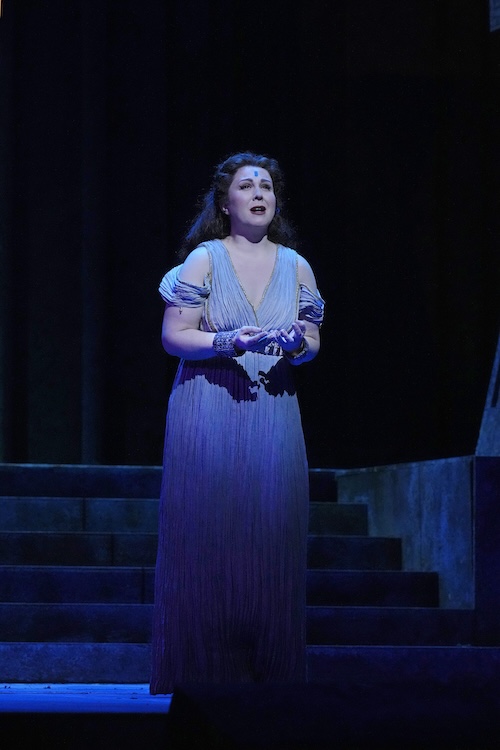Nilsson’s luminous debut lifts the Met’s Tomb Raider “Aida”

Michael Mayer’s new staging of Verdi’s Aida returned to the Metropolitan Opera on Friday evening. The production had a rocky start at its premiere on New Year’s Eve when an ailing Piotr Beczała’s ill-advised attempt to sing Radamès untethered the entire show. No such problems plagued this performance, which featured the triumphant company debut of Christina Nilsson in the title role.
It was a heavy lift to replace Sonja Frisell’s beloved staging of Aida, but Mayer was up to the challenge. The injection of a Tomb Raider theme into the action is relatively innocuous and embraced by many. Oleg Glushkov’s choreography may be sui generis, but it is also a crowd-pleaser. The energy and athleticism of the male dancers in Act II was astounding. The prolonged applause afforded them surpassed only by that which rained down upon Nilsson after her stunning “O patria mia.”
Nilsson may be the most demure Aida ever to grace the Met stage. Her simple sheath instantly marks her as an outsider, but her regal bearing is that of a princess. Simplicity was Nilsson’s trump card, as visually and vocally, she stood out from the oversized and vocally super-charged Egyptians.
The Swedish soprano’s voice is cut from lyrical cloth but has an edge of Nordic steel. Her “Ritorna vincitor!” rang out impressively, but even more captivating were her spinning, luminous high notes, which crowned the aria. Sparks flew when Nilsson’s Ethiopian princess and Judit Kutasi’s Amneris squared off as rivals for Radamès, but this Aida shone most brightly in the Nile Scene.
Nilsson’s “O patria mia” was imbued with softness and passion, her shimming voice caressing Verdi’s soaring vocal lines with radiance and ease. Her duets with Roman Burdenko’s Amonasro and Brian Jagde’s Radamès were suffused with quieter depths of affection and drew equally fine-grained singing from them. The beauty of Nilsson’s voice and her emotional sincerity made this scene the emotional bedrock of the performance.
Jagde has garnered plaudits for his robust Radamès in prior appearances at the Met, but this was his first appearance in Mayer’s production. The tenor’s vocal default mode was an electrifying heroic overdrive. He blazed his way through “Celeste Aida” topping it with a final ringing B-flat with no attempt to approximate Verdi’s dynamic marking. There was finesse though in his approach to the aria, and even more in his duets with Nilsson’s Aida where tenderness vied with ardor.
Katusi, the only returning member of the original cast, was once again phenomenal as Amneris. The scorned woman’s rages were volcanic outpouring of molten sound. Such ferocity made Katusi an unlikely temptress, but she could summon a smoldering sensuality in her doomed attempts to conquer Radamès’s heart. The intensity of Katusi’s performance was cemented when the audience gasped as she drove a dagger into her heart as the curtain fell. That cinematic demise may not be in the libretto, but it made for great theater.
Roman Burdenko made an impressive Met debut in the role of Amonasro. His baritone and demeanor are fitting of an Ethiopian king, whether squaring off with his adversaries or cajoling Aida to ensnare Radames and betray his country. Alexander Vinogradov’s Ramfis and Krzysztof Bączyk’s towering King added additional force to the cast. Ann-Kathrin Niemczyk, in her Met debut, lent her lovely lyrical voice to floating strains of the Priestess.
The energy and drive that coursed through the performance came directly from conductor Alexander Soddy. Having conducted La Bohème the night before, he may have been running on adrenalin, but the results were thrilling.
Soddy encased Nilsson in a softer tonal landscape. He may have reveled in the glorious heights that the other singers, chorus, and orchestra reached in the opera’s climaxes but luxuriated in the equally emotion-laden softer passages in Verdi’s score. By doing so, he provided the setting for Nilsson’s Aida to conquer.
Aida continues through March 29 with Christina Nilsson in the tile role, then running through May 9 with cast changes. metopera.org